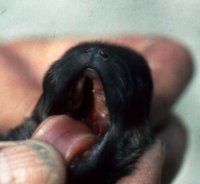 Back
Back
CONGENITAL
CLEFT PALATE AND VITAMIN A
First broadcast on www.provet.co.uk |
This information is provided by Provet for educational purposes only.
You should seek the advice of your veterinarian if your pet is ill as only he or she can correctly advise on the diagnosis and recommend the treatment that is most appropriate for your pet.
Cleft palate is a common abnormality seen in newborn cats, dogs and other species. One possible cause is excessive vitamin A intake during pregnancy.
(A detailed resume of cleft palate has been prepared by Provet this week and can be accessed by following the link at the end of this Clinical Update).
Congenital cleft palate is an abnormality which is thought to occur during fusion of the maxillary process with the medial nasal process, when the mesodermal fusion develops across the fused epithelial surfaces. If the epithelial barrier does not degenerate or if the mesodermal connective tissue is deficient cleft palate results.
A neonatal puppy with severe cleft palate
An hereditary basis for the disease is suspected but the mechanism has not yet been determined however any such genetic trait is thought to be multifactorial recessive, polygenic and dominant with partial penetration.
In 1967 Wiersig and Swenson reported that 125,000 IU of Vitamin A per kilogram body weight given to Beagle bitches on days 17-22 of gestation resulted in cleft palate developing in their puppies.
Vitamin A is an essential nutrient for normal growth and defects in bone growth are seen with insufficient as well as excessive dietary intake. Vitamin A has a controlling influence over both the osteoblasts and osteoclasts in epithelial cartilage and so there is a rational explanation as to why excessive vitamin A intake might result in cleft palate.
In addition, commercially prepared complete pet foods contain more than sufficient available vitamin A yet breeders and owners frequently supplement their pet's ration with vitamin supplements. High vitamin A content is also a feature of many natural food sources including liver and fish oils. Cod liver oil is a very popular nutritional supplement with pet owners and it contains 18000mg per 100ml (4000 IU per gram). Some vitamin injections contain as much as 500,000 IU of vitamin A per ml.
Provet's Recommendations :
- Excessive dietary vitamin A intake must be avoided during pregnancy, so
- Avoid unregulated multivitamin or vitamin A supplementation during pregnancy
- Avoid unregulated liver intake during pregnancy
- Avoid unregulated fish oil supplementation during pregnancy
- Great care is needed when administering parenteral vitamin supplements to pregnant animals
- Feed a complete pet food formulated for pregnancy without supplements
- Consider excess dietary vitamin A intake as a possible cause for congenital cleft palate when it occurs
Feedback Request
Provet is conducting an investigation into the possible link between excessive dietary vitamin A intake and the occurrence of congenital cleft palate. If you see a case please submit the case history with full details of the food given and any nutritional supplements administered to feedback@provet.co.uk . If we get sufficient cases submitted we shall publish the results on this website.
For further information about cleft palate CLICK HERE
Updated January 2016
d>
